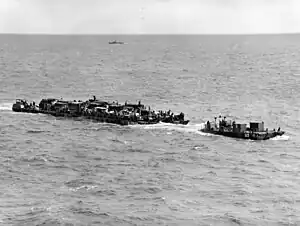Rhino ferry
A rhino ferry is a barge constructed from several pontoons which are connected and equipped with outboard engines, used to transport heavy equipment and people. Rhino ferries were used extensively during the Normandy landings[1] and other theaters (Attu, Africa, Sicily, Italy); their low draft was well-suited for shallow beaches, and they could also be used as piers when filled with water.[2] An alternative to tank landing craft, they were operated by United States Navy Construction Battalions.[3] They ferried their cargo from the outlying Landing Ships, Tank to the shore.[4]

For the Normandy invasion, components were shipped from the US. Initial construction in the UK was by the USN Construction battalions. Rhinos (and causeways, which used the same components) were also assembled by British Army Royal Engineers.[5]
See also
- Mexeflote – type of Landing raft, similar device, 1960s to present day
- Floating battery – ship type
- Barracks ship – Watercraft serving as floating personnel accommodation
- Type B ship
- Navy lighterage pontoon
References
- Mayo, Lida (1991). "The Far Shore in Normandy". The Ordnance Department: On Beachhead and Battlefront. Washington, DC: United States Army Center of Military History. p. 240.
- "Boxes Joined as Barge Float Allies to Beaches". Popular Mechanics. September 1944. Retrieved August 14, 2014.
- Symonds, Craig L. (2014). Neptune: The Allied Invasion of Europe and the D-Day Landings. Oxford UP. p. 200. ISBN 9780199986125.
- Phaneuf, Brett (February 17, 2011). "D-Day - The Untold Story". BBC. Retrieved August 15, 2014.
- Chapter II: Utilization Of Naval Facilities In U. K. For Assembly And Outfitting Of Equipment For Installation On Invasion Beaches, And Selection And Training Of Seabee Crews For The Invasion